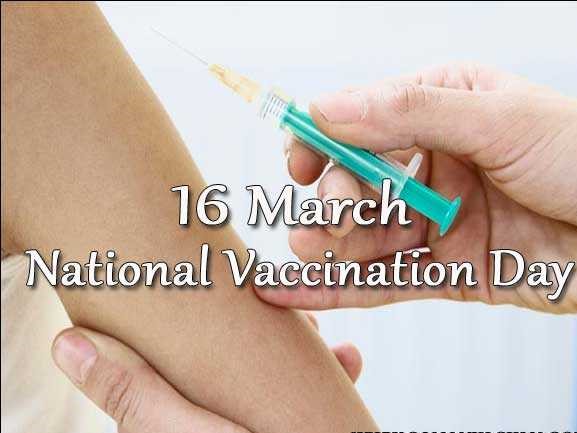
NATIONAL VACCINATION DAY
On March 16th every year, India observes National Vaccination day, also known as Immunization day. The Government of India celebrates National Vaccination Day every year to convey the importance of vaccination to the people of the country. In the year 1995, the first dose of an oral vaccine against polio was given in India. India has been observing the Pulse Polio Programme since 1995. The prime purpose behind the celebration of National Vaccination Day is to make all people aware of arming against polio and eradicating it completely from the world.
National immunization days (NIDs) are mass campaigns during which supplemental doses of oral poliovirus vaccine (OPV) are given to all children in a country to interrupt the transmission of wild polioviruses. Vaccination is a simple, safe, and effective way of protecting people against harmful diseases, before they come into contact with them. It uses your body’s natural defenses to build resistance to specific infections and makes your immune system stronger.
Vaccines train your immune system to create antibodies, just as it does when it’s exposed to a disease. However, because vaccines contain only killed or weakened forms of germs like viruses or bacteria, they do not cause the disease or put you at risk of its complications.Most vaccines are given by an injection, but some are given orally (by mouth) or sprayed into the nose. Today there are vaccines available to protect against at least 20 diseases, such as diphtheria, tetanus, pertussis, influenza and measles. Together, these vaccines save the lives of up to 3 million people every year.
When we get vaccinated, we aren’t just protecting ourselves, but also those around us. Some people like those who are seriously ill, are advised not to get certain vaccines – so they depend on the rest of us to get vaccinated and help reduce the spread of disease.
National Immunization Day 2021 Theme promoted is “Vaccines Work for All”.
Vaccines work by training and preparing the body’s natural defenses – the immune system – to recognize and fight off viruses and bacteria. If the body is exposed to those disease-causing pathogens later, it will be ready to destroy them quickly – which prevents illness.
‘Herd immunity’, also known as ‘population immunity’, is the indirect protection from an infectious disease that happens when immunity develops in a population either through vaccination or through previous infection.
Herd immunity is an important attribute of vaccines against polio, rotavirus, pneumococcus, Haemophilus influenza type B, yellow fever, meningococcus and numerous other vaccine preventable diseases. Yet it is an approach that only works for vaccine-preventable diseases with an element of person-to-person spread. For example, tetanus is caught from bacteria in the environment, not from other people, so those who are unimmunized are not protected from the disease even if most of the rest of the community is vaccinated.
All the ingredients of a vaccine play an important role in ensuring a vaccine is safe and effective. Some of these include:
- The antigen. This is a killed or weakened form of a virus or bacteria, which trains our bodies to recognize and fight the disease if we encounter it in the future.
- Adjutants, which help to boost our immune response. This means they help vaccines to work better.
- Preservatives, which ensure a vaccine stays effective.
- Stabilisers, which protect the vaccine during storage and transportation.
Vaccine ingredients can look unfamiliar when they are listed on a label. However, many of the components used in vaccines occur naturally in the body, in the environment, and in the foods we eat. All of the ingredients in vaccines – as well as the vaccines themselves – are thoroughly tested and monitored to ensure they are safe.
Any unexpected adverse side effects that are reported to WHO are evaluated by an independent group of experts called the Global Advisory Committee on Vaccine Safety.

